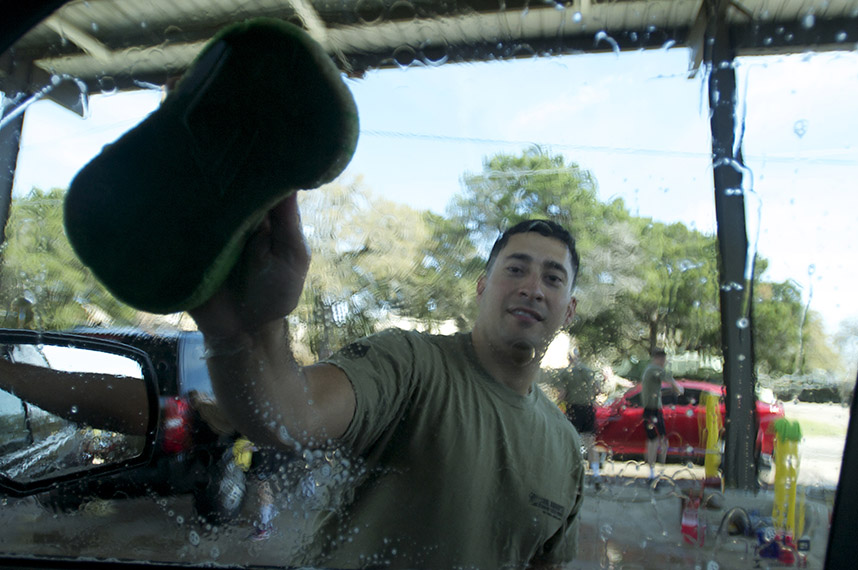Candidates learn to take charge of their future
Story by: Pvt. Kourtney Grimes
Posted On: March 8, 2016
 Members of Warrant Officer Candidate School Course 16-01 host a car wash at Camp Mabry in Austin, Texas, March 5, 2016, to raise funds for their graduation ceremony. The candidates are in Phase II of the three-part course that will turn them into technical experts in their fields within the United States Army. (U.S. Army National Guard photo by Pvt. Kourtney Grimes/Released)
Members of Warrant Officer Candidate School Course 16-01 host a car wash at Camp Mabry in Austin, Texas, March 5, 2016, to raise funds for their graduation ceremony. The candidates are in Phase II of the three-part course that will turn them into technical experts in their fields within the United States Army. (U.S. Army National Guard photo by Pvt. Kourtney Grimes/Released)
Candidates of the Texas Army National Guard’s Warrant Officer Candidate School organized a car wash to raise funds for their graduation ceremony at Camp Mabry in Austin, Texas, March 5, 2016. This event is one of several tasks that the candidates will execute without guidance or direction throughout their course.
“This project is entirely led by candidates,” said Warrant Officer Candidate Travis Chappell, a unit supply specialist in the Army Reserves. “We write the operational order, figure out what supplies we need, figure out the route, locate the facility we are going to use, and we do all of it to bring this big project together with a group of individuals that were strangers four or five months ago.”
Chief Warrant Officer 2 Patricia Crawson, a WOCS instructor, provides the candidates with the mission goal and they tackle the objective as a team.
“We provide [candidates] with the training schedule,” said Crawson, “but they get themselves up in the morning, clean the barracks, and conduct physical readiness training. They are ultimately responsible for being in the right place at the right time. That’s how we evaluate the various leadership positions.”
The WOCS program is broken up into three phases: online training courses, the classroom warrant officer candidate course, and a two-week resident phase in Alabama.
“In the first phase, candidates complete two online classes,” said Candidate Erikia Dunn. “In the second phase, they attend five multiple unit training weekend assemblies and get a feel for what the school is actually like. Phase three is a two-week course at Fort McClellan that includes an academic exam, land navigation, and a week in the field doing situational training exercise lanes.”
With only mission requirements provided, the candidates must reevaluate their accustomed leadership roles as they improvise solutions and demonstrate their creativity.
“You have to transition from an NCO mindset to an officer mindset,” said Dunn. “As an NCO we are the ‘do-ers’ of the task, but as an officer we are the planner of the task.”
In addition to the physical and logistical training, candidates must reconcile the crucial differences between the mentality of a non-commissioned officer and a warrant officer.
Chief Warrant Officer 5 Ernest Metcalf, Command Chief Warrant Officer for the Texas Army National Guard, maintains regular contact with both his instructors and the students, ensuring their development is in keeping with the standards of the Warrant Officer Corps.
“It takes some perseverance to complete any officer candidate school,” said Metcalf. “On a monthly basis I meet with all of the candidates to motivate them to persevere through all of the mental and physical challenges they may face within the warrant officer candidate school.”
After months of intensive training, physical rigors, and intellectual challenges, successful candidates graduate and become the technical and tactical experts of the United States Army.
“You have to be serious about being a warrant officer because this class is not a walk in the park,” said Dunn. “It will challenge you as a person, it will challenge you as a leader and it will challenge you in every aspect of your life.”